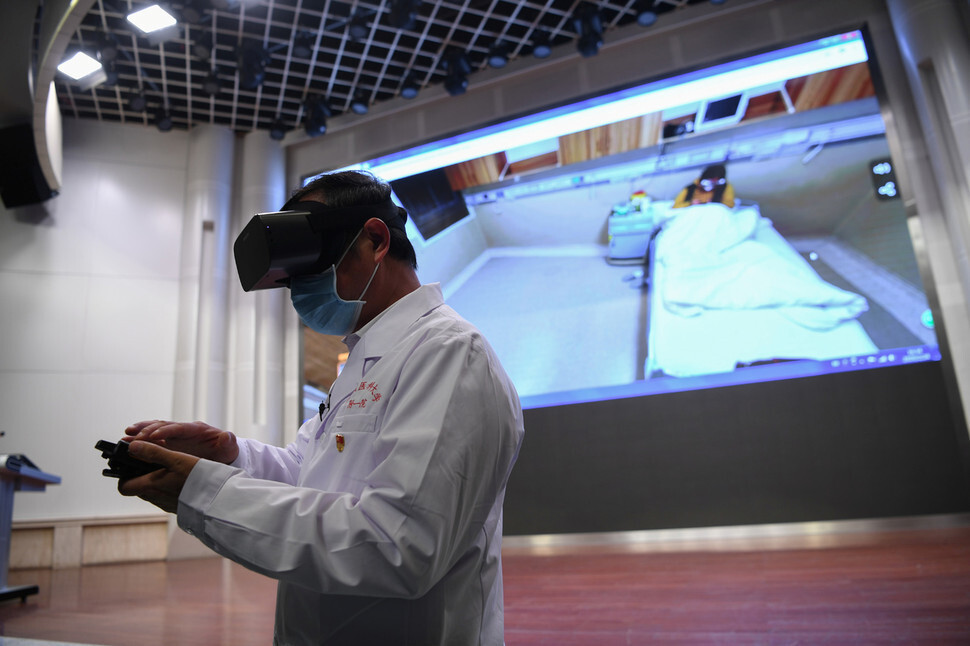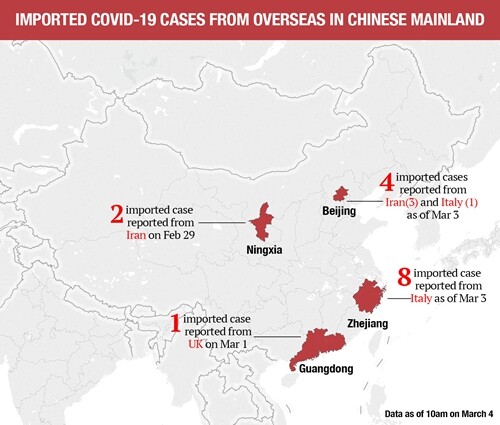hankyoreh
Links to other country sites 다른 나라 사이트 링크
Beijing worrying about “reverse transmission” as new coronavirus cases falls to around 100 per day

The number of new novel coronavirus diagnoses in China has fallen to around 100 per day. Now, more and more overseas Koreans are complaining of hassles as Chinese authorities ratchet up their disease control measures to prevent “reverse transmission” of the coronavirus from overseas.
According to a Mar. 3 survey by the Chinese National Health Commission (NHC), the number of new coronavirus diagnoses on Mar. 2 totaled 125. With the number of new diagnoses in Wuhan dropping from 193 on Mar. 1 to 111 on Mar. 3, the total number of new diagnoses per day has fallen to around 100 for the first time since mid-January. Thirty-one new deaths were reported on Tuesday, bringing the total to 2,943 to date.
As the spread of coronavirus within China reaches stable levels, a growing number in the country are calling for measures to present “reverse transmission.” In the city of Lishui, Zhejiang Province, a 31-year-old surnamed Wang and six other Chinese nationals returning from Italy were diagnosed with the coronavirus. In Beijing, a Chinese national returning from Iran was also diagnosed, bringing the total reported number of reverse infections to date to 12. The state-run Global Times reported that “Chinese living overseas are being exposed to danger as coronavirus spreads on a global scale.”

“More Chinese nationals overseas are in a dilemma as to whether they should return or continue to stay in the country where they are currently residing,” the newspaper said.
“Public health authorities must strike a balance between the overseas Chinese who wish to come home and the war that is being waged in China to stop the coronavirus,” it added.
Public health authorities have cited “preventing reverse infection” as a basis for stepping up control measures such as quarantining and full-scale coronavirus screening for passengers on flights originating in countries such as South Korea, Japan, Iran, and Italy. While the authorities have argued that the measures “apply equally to foreign and Chinese nationals,” they have shown reluctance to intervene in aggressive tactics implemented by local Chinese governments and regional resident committees, including attempts at forced quarantining. A total of 841 overseas Koreans were subjected to self-quarantine or designated quarantine upon entering China over the 14 days before Mar. 3.
By Jung In-hwan, Beijing correspondent
Please direct comments or questions to [english@hani.co.kr]

Editorial・opinion
![[Editorial] Penalties for airing allegations against Korea’s first lady endanger free press [Editorial] Penalties for airing allegations against Korea’s first lady endanger free press](https://flexible.img.hani.co.kr/flexible/normal/500/300/imgdb/original/2024/0502/1817146398095106.jpg) [Editorial] Penalties for airing allegations against Korea’s first lady endanger free press
[Editorial] Penalties for airing allegations against Korea’s first lady endanger free press![[Editorial] Yoon must halt procurement of SM-3 interceptor missiles [Editorial] Yoon must halt procurement of SM-3 interceptor missiles](https://flexible.img.hani.co.kr/flexible/normal/500/300/imgdb/child/2024/0501/17145495551605_1717145495195344.jpg) [Editorial] Yoon must halt procurement of SM-3 interceptor missiles
[Editorial] Yoon must halt procurement of SM-3 interceptor missiles- [Guest essay] Maybe Korea’s rapid population decline is an opportunity, not a crisis
- [Column] Can Yoon steer diplomacy with Russia, China back on track?
- [Column] Season 2 of special prosecutor probe may be coming to Korea soon
- [Column] Park Geun-hye déjà vu in Yoon Suk-yeol
- [Editorial] New weight of N. Korea’s nuclear threats makes dialogue all the more urgent
- [Guest essay] The real reason Korea’s new right wants to dub Rhee a founding father
- [Column] ‘Choson’: Is it time we start referring to N. Korea in its own terms?
- [Editorial] Japan’s rewriting of history with Korea has gone too far
Most viewed articles
- 160% of young Koreans see no need to have kids after marriage
- 2Months and months of overdue wages are pushing migrant workers in Korea into debt
- 3Presidential office warns of veto in response to opposition passing special counsel probe act
- 4[Editorial] Penalties for airing allegations against Korea’s first lady endanger free press
- 5Historic court ruling recognizes Korean state culpability for massacre in Vietnam
- 6Hybe-Ador dispute shines light on pervasive issues behind K-pop’s tidy facade
- 7Japan says it’s not pressuring Naver to sell Line, but Korean insiders say otherwise
- 8[Guest essay] How Korea must answer for its crimes in Vietnam
- 9Story of massacre victim’s court victory could open minds of Vietnamese to Korea, says documentarian
- 10Historic verdict on Korean culpability for Vietnam War massacres now available in English, Vietnames